Potatoes are one of my favorite foods to dehydrate. They are just so versatile, and rehydrate really well. Once dried, they shrink and loose weight. There won’t be an issue with storing them for long time when stored correctly and no worry about sprouting or molding. Usually we purchase a few hundred pounds of potatoes in the fall when they are fresh, then can/freeze/dehydrate them to use the rest of the year – then we don’t’ have to buy any potatoes all year. I don’t know about you, but I’m not a fan of hauling around sacks of potatoes each month. I’d rather get it all done at once.
We dehydrate in itty bitty cubes and bite sized cubes, slices, shreds (hashbrowns) and mashed. We wash and peel (or not) the potatoes before cutting them how we want them. It’s important to keep your dices and slices as uniform as possible for even drying. To aid in this, because I do not have mad knife skills, I use a mandoline for slicing (but DO please use caution. I can’t tell you how many times I have almost lost a finger using this thing. Well, maybe it’s just me. Just, be careful). And for dicing I use a french fry cutter. Yup. I run them through the cutter using the small grate and the larger one. Once potatoes are sliced lengthwise, I cut them into dices very easily. I keep a cutting board over one side of my sink so as soon as I slice or dice my potatoes, I can slide them right into a sink full of cold water and a bit of lemon juice to keep the potatoes from turning brown.
To make hash browns, I typically do not peel the potatoes – I save all my oddly shaped potatoes that would be hard to peel for this (we often buy potato seconds, which include imperfect potatoes). I run them through the food processor using my shredding blade, steam them for 4-6 minutes, dunk them in ice water, shake them out and lay them in a somewhat thin layer over the dehydrator trays. Once dry I break up the sheet of dry potatoes and store them.
The procedure is the same for dices and slices. Steam, stop the cooking in an ice bath (I like to fill one side of my sink with ice cold water from the well to dunk the potatoes in after they come out of the steamer, then set my dehydrator trays on the other side of the sink so the water can drip off easily as I put them on the tray, without making a huge, wet mess anywhere else), set in the dehydrator, and let them start to dry.
Mashed potatoes are easy – simply cook potatoes until soft. Mash. Let cool slightly, then spread over dehydrator trays. Flip halfway through drying providing it has a leathery texture on top (you may want to line your trays with plastic wrap to help flip them easily – after the first flip, remove the plastic wrap and pitch it. The sheet of mashed potatoes will be dry enough there won’t be any issue with it sticking to the tray or falling through). Dry until crisp. Break up the sheet of mashed potatoes and store – or run them through the food processor until they are flakes or a powder, then store in a jar. Do not add milk, butter, or anything else -just dry plain potatoes. You can add other things when you rehydrate following typical directions for rehydrating any dry potato flakes. I have no scientific reason to explain this, but I do find that if you leave the trays in the fridge overnight to chill, the texture of rehydrated potatoes is much like that of the boxed variety of the store. You may want to give that a try if you have room in your fridge.
Potatoes should dry at 125F until crisp – can be 8-10 hours or more. To rehydrate, pour enough boiling water to cover potatoes, cover with a lid and let them sit for about 20 minutes. Drain and proceed to use. Cubes may benefit from 20 minutes in boiling water, vs. being covered with water that will gradually cool off. If you are making hash browns, I like to roll them in a towel after rehydrating to remove as much moisture as possible. I actually prefer rehydrated hash browns vs. making them fresh.
To use: casseroles, potatoes au gratin, cheesy potatoes, breakfast hashbrowns and breakfast casseroles, soups. I even have good luck rehydrating cubes and roasting them after coating them with olive oil and seasonings of some sort (such as dry onion soup mix).
- We often fill the back of our van up with potatoes once a year.
- I like using a french fry cutter….
- …. to help me cube my potatoes evenly.
- I use something like this to help steam potatoes.
- Then dunk the steamed potatoes into ice cold water.
- For something like diced potatoes, I set my trays right next to the sink so the potatoes can drain as they get put on the dehydrator tray.
- These are the finished potato slices.
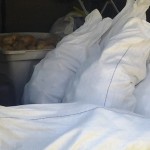
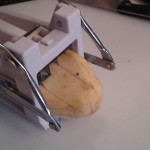
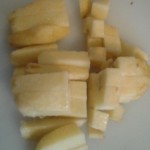
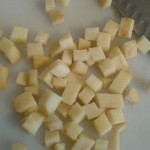
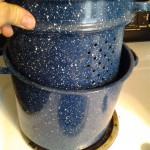
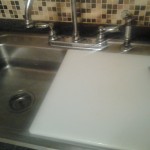
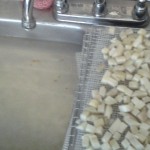
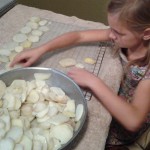
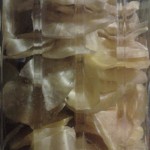
Thanks again for the blog.Really thank you! Fantastic.
Very good blog article.Much thanks again. Cool.
Major thankies for the article.Much thanks again. Fantastic.
I cannot thank you enough for the article.Thanks Again. Great.
Say, you got a nice blog post.Really thank you! Much obliged.
This is one awesome blog post.Really looking forward to read more. Fantastic.
A round of applause for your blog.Much thanks again.
Muchos Gracias for your blog post.Much thanks again. Really Cool.
Hey, thanks for the post.Really thank you! Great.
I am so grateful for your blog article.Thanks Again. Really Cool.
I really liked your article post.Really looking forward to read more. Really Great.
Thanks for the blog article.Really thank you! Want more.
Thanks-a-mundo for the article.Really thank you! Want more.
I really enjoy the article post.Much thanks again. Great.
Im grateful for the article.Much thanks again. Great.
I really like and appreciate your article.Much thanks again. Fantastic.
wow, awesome blog article.Much thanks again. Fantastic.
Im thankful for the blog. Much obliged.
I really liked your post. Cool.
wow, awesome post.Really thank you! Want more.
Wow, great blog.Thanks Again. Want more.
Enjoyed every bit of your post. Want more.
Appreciate you sharing, great blog.Really thank you! Fantastic.
Thank you for your post.Really looking forward to read more.
Thanks so much for the blog article.Really looking forward to read more. Great.
Really informative blog post.Really looking forward to read more. Really Cool.
Awesome post.Really thank you! Great.
I really enjoy the blog article.Thanks Again. Really Great.
Great blog.Really thank you! Great.
Appreciate you sharing, great blog post.Really thank you!
I really liked your post.Really thank you! Fantastic.
I value the blog.Really looking forward to read more. Really Great.
I loved your blog post.Really thank you! Cool.
Fantastic article post.Really looking forward to read more.
Thanks a lot for the post.Really thank you! Cool.
Really enjoyed this article post.Really thank you! Keep writing.
I value the blog article.Thanks Again. Cool.
I really like and appreciate your article post.Really thank you! Much obliged.
Enjoyed every bit of your article post.Much thanks again. Great.
Really enjoyed this post.Really looking forward to read more. Want more.
Appreciate you sharing, great blog post. Will read on…
I am so grateful for your article post.Really looking forward to read more. Much obliged.
I really like and appreciate your blog article. Really Great.
I truly appreciate this article post.Really thank you! Really Great.
A big thank you for your article post.Much thanks again. Really Great.
Im grateful for the blog.Really thank you!
A big thank you for your article post.Really looking forward to read more. Keep writing.
Really enjoyed this blog.Much thanks again.
Great, thanks for sharing this article.Really looking forward to read more. Awesome.